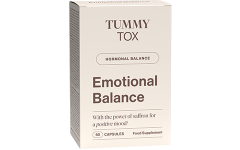How hormonal imbalance may be impacting your mental wellbeing
Have you ever wondered why you can’t be happy all the time? Have you ever had one (or three) of those days when productivity feels like a distant dream, a smile is an imaginary thing, and motivation is nowhere to be found?
Although it sounds like a typical Monday, it’s okay to admit that you feel like that on other days of the week, too. We've all been there and know how hard those feelings can get.
When life gives you lemons, it’s not always easy to make lemonade. Hard situations (such as work-life balance, complex personal challenges, or simply feeling stressed) can greatly impact our mental health and wellbeing.
And if the question ‘Can hormones affect mood?’ is floating in your mind, we can confirm – they can! Let’s dive into how the symptoms of hormonal imbalance can affect your mental health and how to help yourself.

Low mood and its origins
Those days when you wake up on the wrong side of the bed have their reasons. Many factors can contribute to bad moods. It can be dealing with difficult situations, such as disagreements with your partner or work drama. Maybe it’s the dreary seasonal tiredness, PMS, or simply missing the sun and lacking vitamin D. These are all the common triggers that can drive you downhill (and give you massive mood swings along the way).
Emotional imbalance can be felt as difficulty concentrating, fatigue, feeling blue, difficulty calming down, sleeping too much (or not enough), and not knowing why you feel a certain way.
How can you rebalance your emotions? It’s not solely up to you, you know. Genetics, diet, hormonal changes, and that infamous stress can be the culprits for causing emotional imbalance. But one thing that has a lot of power over your emotions is your hormones.
Happy hormones
As women, our bodies are filled with hormones, and sometimes it feels like it’s all we have. Along with oestrogen and progesterone, there are also happy hormones in your body! The emotional state of happiness comes from four special brain chemicals: dopamine, serotonin, endorphins, and oxytocin.
So, what do they actually do?
- The feel-good hormone dopamine takes care of your energy, memory and motivation. It's an important part of your brain’s reward system.
- Your mood depends on serotonin, which also brings focus, calmness, and emotional stability when balanced.
- Instead of buying painkillers, it’s good to balance your endorphin levels, as this hormone is a natural pain reliever.
- Our favourite love hormone, oxytocin, builds empathy, trust, and relationship bonding. You can physically feel this one when you’re making love or when you give birth.
Symptoms of hormonal imbalance in mental health and wellbeing include anxiety, sadness, brain fog, trouble sleeping, and even low libido. This happens when the mood-regulating chemicals are imbalanced. But don’t panic, it’s nothing that can’t be solved.
5 tips to boost your happy hormones
There are a few natural remedies for hormonal imbalance in females, which can help bring a smile to your face.
1. Laughter is the best medicine
Even when you’re not feeling your best self, a true friend can always make you laugh, sometimes even to tears.
Scientifically, laughter boosts your endorphin levels, fills your lungs with oxygen, stimulates heart and muscles. Of course, laughing won’t heal physical issues, but it can relieve feelings of anxiety, stress and boost a good mood by stimulating dopamine and endorphins.
So, pick up your phone, call your girls and meet up for some drinks and a board game or simply chill on the couch and watch a movie (we suggest Anyone but you) to feel the rain on your skin – you'll know what we mean when you watch it.
2. Get some sunlight
Spending time in the sun is like giving your brain a big serotonin hug. This hormone can boost your mood and help you feel calmer and focused so you can easily complete all your daily tasks.
There are plenty of articles on how UV light causes wrinkles and accelerates aging. But the sun's rays also help boost serotonin levels. Include a daily walk of at least 15 minutes, but don’t forget sunscreen!
3. Get active
One workout a day pushes sadness away. Physical activity (whether that's a gym work-out or a walk in the park) helps with your emotional state as it releases endorphins.
And it doesn’t end here – if you include exercise in your daily routine, you can increase your dopamine and serotonin levels. You can start slowly with walks, jogging a few kilometres a day, with some yoga or Pilates, and then gradually move up to weight-lifting (at home or at the gym, whichever you prefer).
Physical activity really does wonders for your overall health.
4. Good food means good mood
You've probably experienced that moment of excitement when your waiter finally brings the meal you ordered to your table. Oh, what joy! But you can achieve these positive feelings at home, too.
Like love, happiness also goes through the stomach. Cooking (and eating, of course) a delicious meal can boost your dopamine and endorphin levels. For an additional oxytocin treat, make a romantic dinner for your partner or invite some friends over for a tasty meal (and have a good laugh, too!).
5. Try supplements
To really trigger your happy hormones, you can help yourself with some supplements and herbal extracts.
- Green tea extract can help you boost dopamine and serotonin
- Probiotics take care of a healthy gut and also trigger serotonin and dopamine release
- Saffron extract has been proven to be a great mood booster, help you become calmer and more optimistic
- Tryptophan helps with triggering serotonin release
- Rhodiola rosea has been traditionally used to help with productivity and relieve stress
- Ginko’s long history of usage shows it has helped with boosting memory for years
Meet Emotional Balance from TummyTox
This one's not just a simple supplement. With emotional stability and women’s health in mind, we have formulated a powerful mood booster based on natural extracts.
It's designed to trigger the production of essential feel-good brain molecules and the release of happy hormones to truly support your positive mood.
What's inside that makes it so powerful?
We didn’t choose just any saffron extract. We searched far and wide for a patented and highly effective saffron extract, Safr’Inside™.
We can proudly say that this spice has been clinically tested and proven to be a positivity bomb. In just 15 days, 77*% of participants in a study confirmed feeling more optimistic, 69*% said they were more relaxed, and a whopping 75*% felt how their emotional balance improved.
And that’s not all. Taking into account all the scientific studies, we added two other happiness treats to this product. To relieve stress and balance those happy hormones, we made our formula stronger with Rhodiola rosea and ginkgo extract.
To reduce tiredness, the multi-tasking women’s daily experience, essential minerals and vitamins are the key. Emotional Balance capsules are packed with magnesium, zinc, selenium, and vitamins C, D3, and B-complex, which make this formula unbeatable when fighting fatigue and symptoms of hormonal imbalance.
By the way, we wouldn’t say we were the best if we didn’t put all our efforts (and knowledge) into this product. For the biosynthesis of crucial happy molecules we added GABA, L-tryptophan, L-phenylalanine, and L-tyrosine to fully support your emotional stability.
If you’re wondering, ‘Can hormonal imbalance cause mood swings?’ The short answer is yes. But Emotional Balance is here to save the day. Start your day on the right foot and achieve all your daily goals easy peasy.
Sources
Noorbala, A. A., Akhondzadeh, S., Tahmacebi-Pour, N., & Jamshidi, A. H. (2005). Hydro-alcoholic extract of Crocus sativus L. versus fluoxetine in the treatment of mild to moderate depression: A double-blind, randomized pilot trial. Journal of Ethnopharmacology, 97(2), 281–284. https://doi.org/10.1016/j.jep.2004.11.004
Pirdadeh Beiranvand, S., Shams Beiranvand, N., Behboodi Moghadam, Z., Birjandi, M., Azhari, S., Rezaei, E., Nazar Salehnia, A., & Beiranvand, S. (2016). The effect of Crocus sativus (saffron) on the severity of premenstrual syndrome. European Journal of Integrative Medicine, 8(1), 55–61. https://doi.org/10.1016/j.eujim.2015.06.003
Agha‐Hosseini, M., Kashani, L., Aleyaseen, A., Ghoreishi, A., Rahmanpour, H., Zarrinara, A., & Akhondzadeh, S. (2008). crocus sativus L. (saffron) in the treatment of premenstrual syndrome: A double‐blind, randomised and placebo‐controlled trial. BJOG: An International Journal of Obstetrics & Gynaecology, 115(4), 515–519. https://doi.org/10.1111/j.1471-0528.2007.01652.x
Products for you
You may be interested




